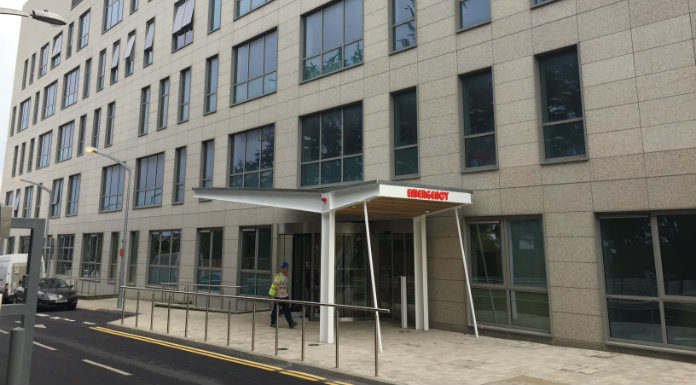Nurses at the region’s main hospital say the ongoing pandemic is no excuse for the continued overcrowding in the facility’s emergency department.
It’s after the INMO called on HIQA to urgently investigate the issue at University Hospital Limerick, following a week where an average of 57 people were waiting for a bed there each day.
There had been hopes that the opening of more than beds and significant recruitment would ease pressures at UHL, but the UL Hospitals Group has stated that attendances at the emergency department ‘have never been higher’.
INMO Midwest Representative Mary Fogarty says COVID-19 is not a reason for overcrowding pressures to be continuing in Dooradoyle.
Statement from the UL Hospitals Group
Over the past number of weeks, University Hospital Limerick, and its Emergency Department, has been managing extraordinary demand for its services, of a type and on a scale never before experienced in the Mid-West.
Demand is such that, despite the additional bed space opened at UHL over the past eight months, many admitted patients have been experiencing long waits for beds. This is not the kind of care we wish to provide, and we apologise to any patient who has experienced a long wait for a bed.
We have noted the INMO’s concerns about the situation, and the Group’s Chief Clinical Director and the Chief Director of Nursing & Midwifery have met with representatives of the INMO this week to discuss and set out specific actions for managing crowding in the Emergency Department in this current period of particularly high demand.
During the past year, there has been an increase in COVID-19 patients, especially during the three periods of peak transmission. And currently, there remains significant demand for beds from people who have been de-listed as COVID-positive, but who continue to make their recovery from the disease.
On Thursday, April 22nd, for example, the total number of inpatients in UHL who were either query-COVID, COVID-positive, post-COVID, or long-COVID, exceeded 40.
COVID-19 infection accounts for only one aspect in the multi-faceted demand for services at UHL. Also during the past year, there has been an increase in serious non-COVID illnesses that have been complicated due to delays in seeking treatment during lockdowns, and which require longer recovery times.
In short, people are getting sicker with more complicated conditions, and patients need to spend longer in hospital to recover from their illnesses.
Data for the first quarter over the past three years at UHL shows a cumulative increase of 0.9-days in length of stay for medical patients in the hospital. This has a significant adverse impact on the bed capacity available in the hospital on any given day.
We are also experiencing record levels of presentations. In the 24 hours between 8am Monday and 8am Tuesday, 241 people attended our Emergency Department. The following three 24-hour patients brought attendances of 283, 243, and 214. Daily emergency presentations at the hospital in excess of 200 are now the norm. The average daily attendance figure for 2019, the last full year pre-pandemic, was 197.
We continue to focus on all aspects of patient flow, including access to diagnostic tests that help ensure timely discharge or transfer of patients. No effort is being spared in ensuring that physical distancing in the hospital is maintained, and wait times are kept to a minimum.
We would also like to reassure the public that all our patients continue to receive expert medical care while they wait. Not all patients are waiting on trolleys. Most are in designated bed spaces (cubicles, bays and beds) in the ED (our COVID-19 emergency admission pathway), and in the non-COVID emergency admission stream of the Acute Medical Assessment Unit and Acute Surgical Assessment Unit. Admitted patients are also waiting in designated surge capacity.
It should be noted that during periods of high demand at the hospital in the pre-pandemic era, we would often have had up to 25 patients on trolleys in wards in the hospital, while also using the Surgical Day Ward for surge capacity. This is no longer the case. The additional bed capacity opened means that patients now wait in ED and designated surge areas, and the beds in the Surgical Day Ward are protected for planned surgeries, allowing access for patients who may otherwise experience delayed episodes of care.
The phenomenon of hospital crowding is multi-factorial, and will not be solved by increasing bed capacity alone. However, we are grateful for the significant increase in bed capacity in UHL over the past number of months. This single room accommodation has provided our patients with the comfort they deserve, and allowed us to better manage infection risk in the hospital, not least during the considerably challenging third wave of COVID-19 in January 2021.
This in no way minimises the upset that people feel when they experience a lengthy wait for a hospital bed, and we apologise to those people, and their families, who have been inconvenienced at this time.
We reiterate our appeal on the public in the region to present at the ED only in the event of an emergency or a serious illness, and first consider all the alternative care options available ot them, including family doctors, out-of-hours GP services, local pharmacies and the Injury Units at St John’s, Ennis and Nenagh Hospitals, which are an excellent option for treatment of broken bones, dislocations, sprains, strains, wounds, scalds and minor burns. Those units are open at Ennis and Nenagh Hospitals (8am-8pm daily), and St John’s Hospital (8am-7pm, Monday to Friday).
If you do have symptoms of COVID-19, it is important that you do not go to the Emergency Department or your GP. Ring them in advance for advice, and avoid contact with other people by self-isolating. In a medical emergency if you have severe symptoms, call 112 or 999. If you are seriously injured or ill or are worried your life is at risk, the ED will assess and treat you as a priority.









